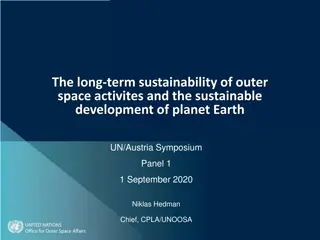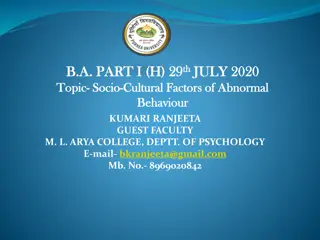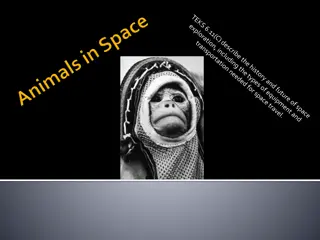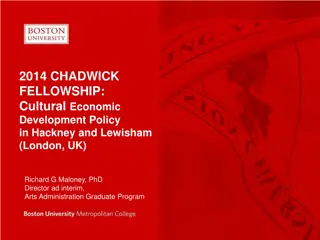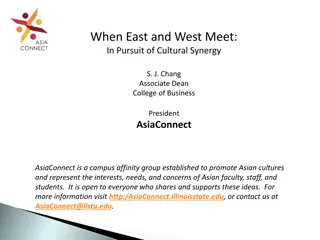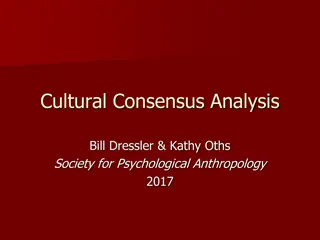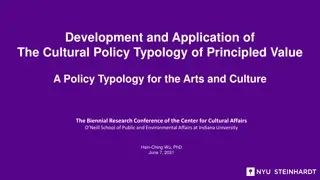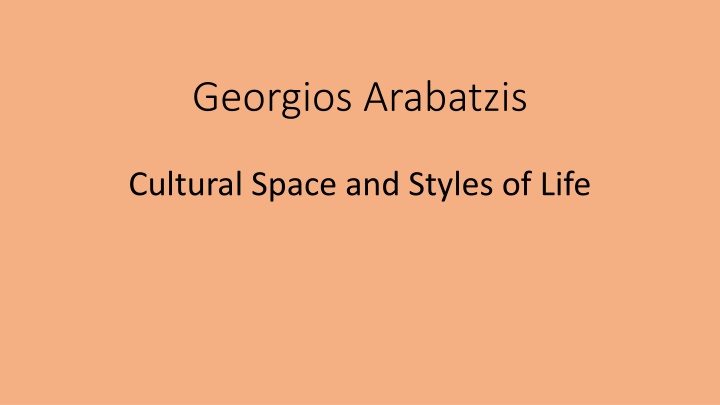
Metropolitan Intellectualism and Cultural Space in Modern Society
Explore the intricacies of metropolitan intellectualism and its impact on cultural space in modern society through the lenses of Georg Simmel and others. Dive into the epistemology of everyday life, shared cognition, and the struggle for individual liberation against societal constraints. Discover how the metropolis influences mental health, reason, and the relationship between culture and the individual soul. Uncover the role of money in shaping the impersonal nature of the metropolitan lifestyle.
Download Presentation

Please find below an Image/Link to download the presentation.
The content on the website is provided AS IS for your information and personal use only. It may not be sold, licensed, or shared on other websites without obtaining consent from the author. If you encounter any issues during the download, it is possible that the publisher has removed the file from their server.
You are allowed to download the files provided on this website for personal or commercial use, subject to the condition that they are used lawfully. All files are the property of their respective owners.
The content on the website is provided AS IS for your information and personal use only. It may not be sold, licensed, or shared on other websites without obtaining consent from the author.
E N D
Presentation Transcript
Georgios Arabatzis Cultural Space and Styles of Life
Epistemology of everyday life Shared cognition of collective action and values Material culture, also. Cultural space as opposed to natural space Styles of life as opposed to spontaneous life
Georg Simmel (1858-1918) The Metropolis and Mental Health (1903)
Simmel uses the term style of life together with other similar, like form of life , typo of life , mode of existence , etc. The problem of the individual Be independent against society, historical heritage and culture / technique of life. Continuation of the conflict of the primitive man against natural (struggle with nature for survival). Struggle for individuation liberation from external constraint resistance of the individual
Relations of culture and individual soul (see Plato) Metropolis (Big City) signifies an intensification of single, always changing impressions Metropolitan impressionism (not the art movement) = definition of empiricism within the city Metropolis = the place of infinite impressions = contrast with rural life The mental life in Metropolis is characterized by intellectualism = Metropolis is the locus of reason
Reason must be seen here as a protective organ against the infinity of impressions and the consequent emotional flow An idea of reason very close to Nietzsche Desinsitivisation of emotional life. What is the force of objectivation of the world, against the subjectivity which is under constant emotional constraint? It is the money. The metropolitan intellectualism is based on money and thus is impersonal.
Money is a common denominator of the crowds that inhabit the Metropolis. The personal element is limited to a small circle of relatives and friends, to the familiar sphere. Numbered space (through money), circle, sphere. The metropolitan market is impersonal, subject to the financial reason alone. This constitutes a new form of objectivism. The Metropolitan form of life is impersonal. The mental state is a calculating one (instrumental or calculating reason).
The world is transformed into an arithmetical relation (money). The time is also calculated (the invention of pocket watches). Nobody must loose time, he / she must be where supposed to be in time. Space measured in time. Distance measured in time. Punctuality is symmetrical to the precise fragmentation of space.
The banal externalities (distance) come in immediate contact with the depths of the soul (everyday life). That is the banal externalities do not concern only the form of life but also the content of life. Against all impulses that go against the punctuality, calculability and exactness. The content of life is an abstraction. Like the way we measure space through magnitude. Thus, we have an intellectualism of existence.
The form of life is structured in impersonal terms. This creates a distinct psychological attitude = the blas outlook (= unimpressed with or indifferent to something because one has experienced or seen it so often before = an everyday snobbism) The stimuli from impressions produce no reaction whatsoever The blas outlook is the incapacity to react = the metropolitan man is all intellect. The things lose their distinctiveness. Only money distinctions continue to exist.
Thingness is lost. Formation of the public opinion = only the public is capable of distinguishing. The metropolitan objectivity devalues the objective world (Paradox) In fact the blas outlook is an attitude of reserve and suspicion. Even more, it is a slight aversion towards the others. The attitude of indifference is in fact a feeling of aversion. The individual is also formed by antipathies.
The metropolitan individuation is achieved through this kind of distantiation between individuals. By the same, this distantiation regulates the socialization = creates the inner circle, the familiar sphere. Here, Simmel proceeds to a GENETIC THEORY of the formation of the Metropolitan society. In the beginning we have small groups that are going to develop to the polis (Aristotle).
In these small groups, there is no personal freedom, no personal development of the individual = rigid, closed groups. The growing number of the groups (polis) produce more interactions and the individual gains a freedom of movement (thus, a greater space is open to the3 individual). Yet, the individuality must be thus regulated. The ancients limits are gone and thus the Metropolitan man feels constrained in small towns or villages. In relation to the modern Metropolis, the ancient polis looks like a small town.
In Ancient Athens we have the discovery of the generic human character = the individual. This generalized individuality goes together with philosophy. Yet, the Metropolitan is freer even compared to the ancient citizen. This produces an individuation of space against the ancient commons. Yet, the Metropolitan individuality is not only pleasure. Often is lonely and deserted. The intellectual horizon is enlarged, the individual psyche is extended to the national and international orders.
The functional space is measured in individual terms. The cultural space of Metropolis is bigger than the actual space. The meanings of things outnumber the things themselves. The self-expression is greater than the objective space. The signs of distinction cover and magnify the objective space. The distinctions are specialized accomplishments of the individuals and are produced through the conflict with the others.
The chances of survival are greater through specialization and distinction. Mental qualities decrease in order to multiply the objective distinctions and accomplishments. The self becomes a status of the self. Thus, we have also a multiplication of individual caprice = the style of life is to be different. The mundanities are brief and repetitive. Individual forms of life through the objectivation of the subjective element.
So is produced a one-sided style of life. Growth of individual discontent. The cultural space is subject to the conquering techniques of the individuals. Life is more easy and more difficult at the same time. Sometimes, there is the general request to return to the noble nature through liberation and emancipation. Yet, liberation and emancipation produce more individual distinction.
Walter Benjamin (1892 1940) Paris, Capital of the 19th Century (1938) Part of the Arcades Project unfinished book by Benjamin focused on Parisian arcades (passages)
The title is already a paradox The city and time What city? The mythical one (Paris) The rise in commercial exchanges leads to the construction of the Parisian Arcades. For Balzac, the arcade is the poetry of the shop window. Beyond commerce, the Arcade cause the admiration.
They were architecturally possible through the construction possibilities of iron It is also the constructive strength of the State. There are also classical overtones (the remembrance of Antique glory). The classical and the new power (iron, trains, circulation of the goods). The engineer is a leading figure. The iron is the triumph of the State will and the public sphere. It is also a structure of the contemporary.
The Arcades form desiring images. The object of the desire here is to fix the imperfections; to put the contemporary in order. This becomes possible through naming. The name reflects the modern and the classical, the power and the nostalgia. The present becomes a utopia in architecture and in fashion. The spirit of the machine is the new utopia = function without moral harm.
The complexities are resolved mechanically. The collectivities are also machines (the clients for example). The Arcades demand for the panoramic view and thus for the wide-depth photography. This is the transcending of painting. The photography is mechanistic, modern and reflects the existing order of things.
Literature becomes also panoramic (see Balzacs Human Comedy). Urban life is henceforth superior to rural life because it is more natural to individuals. Photography makes it more natural. From the landscape in painting we move to photographic panoramas. Photograph is also closer to fashion. The urban space becomes exciting.
The photograph is also implied in advertising. Paris is also the capital of international fair. Celebrating the liberation from labor through the merchandise. The international fair of Paris leads to the idea of the industrialization of the whole planet. The industrialization is totally and wholly positive. The high places of commerce demonstrate life as it ought to be .
From facts we pass to values. The merchandise is utopia (good life) and cynicism (commerce) a strange combination. There is a real theology of the merchandise. The goods of market do not only satisfy needs they offer the glamour of life. The Market is the modern world, a new world. The merchandise is at the center of a radiating light.
The private space must be also decorated. The apartment is the world. The decoration must be renewed = fashion. The decoration is at the same time typical and individual it represents the soul of the tenant. The design is a language of mediation between individuals. New material give way to new plastic forms. Rise of the industrial art.
The individuation of houses leads to the idea of the crime novel = traces of individual action in space. The urban space creates also sadness (Baudelaire, Spleen). The poet is a walker within the city (fl neur). Through the city is like standing at the doorstep of things. The true place of the poet is the crowd. The department store combines the interior and the crowd. Thanks to the department store, the intellect visits the market place.
The walker faces space in an impressionistic manner. Paris in the 19th Century is the literature. As Spleen, it attacks the idealism. It becomes ambiguous. Reality and dream. The merchandise is also material and fetishistic. The Arcades are the model-image of this situation. The snobbism is important in art and in fashion.
Art for arts sake the total work of art the art is a world apart. Estheticism is against the particular individual = the generic individual. The State is also the whole world. The snobbism leads to addiction (opium, absinthe). The dream enters Art = the surrealism.
Henri Lefebvre (1901 1991) Writings on cities
The City and the autonomous sciences The autonomous sciences are fragmentary and are risen against the totality of philosophy. Historians, economists, demographers, sociologists. The past and the possibilities of the city in a fragmentary way. Yet, this fragmentation includes a totality of a precise (epistemological) strategy. Thus, the rise of the specialist.
The existence of the global that never becomes total. (Never leading to a synthesis). A global representation. The uniting factor is the planning of the city. City as a global planning. The need for theory. Theory must explain the separation of theory from practice (paradox).
Planning is interdisciplinary. But it must also be critical. Thus the need for philosophy. Philosophy offered the totality and the synthesis needed. The city is something different from space.
The city is linked to philosophy (Ancient Athens). Plato = Politeia. Lefebvre gives the genealogy of the city presented by Aristotle. The city makes what we call the commons. The relation of philosophy to the city is the rise of Reason. Philosophy refers to totality because it elevates itself over the divisions of craftsmen. The logos was this collecting, uniting element.
The gathering of differences. The opinions of the philosophers make a totality of science. With the middle ages we have a return to the countryside, to the double hierarchy of feudalism that makes theology superior to philosophy. In modern philosophy we have a new gathering that is historical (the logical is the real and the real is the logical, Hegel). A gathering in time. In time, philosophy will achieve itself. The totality no longer refers to the city.
The Mediterranean The sea of mediation (in-between Earth) Epistemological order of styles of life The Mediterranean as the source of civilization The past
Yet, a space of irreconcilable moral attitudes It needs the Northern Technology It is a computable world (the past and technology) The past cannot be actual Only technology can be actual

![Read⚡ebook✔[PDF] Linking the Space Shuttle and Space Stations: Early Docking Te](/thumb/21519/read-ebook-pdf-linking-the-space-shuttle-and-space-stations-early-docking-te.jpg)
![READ⚡[PDF]✔ Emerging Space Powers: The New Space Programs of Asia, the Middle Ea](/thumb/21554/read-pdf-emerging-space-powers-the-new-space-programs-of-asia-the-middle-ea.jpg)
